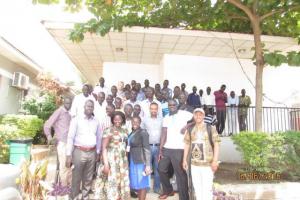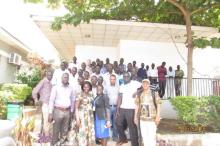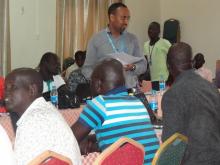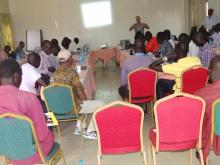Scaling up the expanded programme on immunization in conflict affected states
Juba, 17 June 2016 - WHO South Sudan in partnership with the MOH, Core group, UNICEF and Bill and Melinda Gates Foundation (BMGF) conducted a three-day refresher training for field supervisors and assistants from the three conflict affected states, namely Jonglei, Unity and Upper Nile, from 15 to 17 June 2016 at Juba Regency Hotel.
The objective of the training was to strengthen the capacity of field supervisors and assistants in routine immunization, surveillance and International Health Regulations (IHR) activities to ensure high coverage of immunization as well as to respond appropriately to possible outbreaks.
The training was launched by Mr. Taban Musa, the Deputy Director for EPI, at the Ministry of Health, who acknowledged WHO’s role in organizing the training and urged the participants to stay focused in order to comprehend the objective of the training.
The 55 participants were trained using a combination of lectures, group works and discussions around all PEI activities that include Routine Immunization (RI) coverage, surveillance indicators and ability to detect diseases and respond to outbreaks as well as managing comprehensive immunization program.
“Strengthening the capacity of health officers will produce tangible results, in investigating and responding to outbreaks as well as ensuring strong routine immunization systems, which will help children receive lifesaving immunizations against vaccine preventable diseases (VPDs) such as polio, measles to name just a few”, says Mr Melisachew A. Ferede, EPI consultant for WHO.
“It was emphasized that achieving an adequate level of immunization coverage is the key viable strategy for translating every child's right to health into reality”, says Dr Sylvester Maleghemi, acting EPI Team Leader for WHO.
He also added that, despite considerable efforts and progress made, South Sudan still needs to do more to address the higher burden of VPD as compared with many countries. This is because we are unable to achieve the required level of immunization coverage especially in conflict affected states, for the control of VPDs.
Immunization is one of the most efficacious, cost-effective and safe public health interventions. It prevents debilitating illness and disability, and saves millions of lives every year.
_____________________________________________
For more information, please contact:
Dr Sylvester Maleghemi - +211905 6779467; maleghemis [at] who.int (maleghemis[at]who[dot]int)
Mr Melisachew A. Ferede - +211956237171; feredem [at] who.int (feredem[at]who[dot]int)
Ms Jemila M. Ebrahim - +211950450007; ebrahimj [at] who.int (ebrahimj[at]who[dot]int)
Below:
01 State supervisors and assistants from the conflict affected state and WCO EPI team in a group photograph at the training. Photo WHO
02 Mr Melisachew A. Ferede moderates a group work on recording and reporting tools. Photo WHO
03 Dr Abdalla Elkasabany makes a presentation on Summary of BMGF-field visit report. Photo WHO






